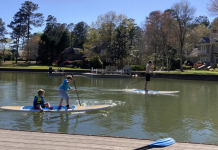 The United States reportedly holds the third-highest divorce rate in the world. While divorces decreased from 2009 to 2019, we await reports from the CDC to learn how the events of 2020 have affected that steady decline within our country. The expectation is that we will see divorce rates increase for the first time in ten years. It could even push the U.S. to the number one country ranking in divorces. The data is disheartening, but what I didn’t expect was to become a part of those numbers.
The United States reportedly holds the third-highest divorce rate in the world. While divorces decreased from 2009 to 2019, we await reports from the CDC to learn how the events of 2020 have affected that steady decline within our country. The expectation is that we will see divorce rates increase for the first time in ten years. It could even push the U.S. to the number one country ranking in divorces. The data is disheartening, but what I didn’t expect was to become a part of those numbers.
As I found myself on this new journey, I was determined to locate positive resources that would allow me to be the best mom possible while navigating this unfamiliar territory. While taking advantage of several different wonderful resources, one I discovered was DivorceCare. Sharing DivorceCare with others is one of the best ways I can try to pay it forward—specifically with other parents who want both personal support as well as guidance on being the parent your child(ren) needs during this season. Here I share a Q&A with Randy Byrd, a local DivorceCare Group leader.
 What is DivorceCare and who should attend?
What is DivorceCare and who should attend?
DivorceCare is a divorce recovery group that offers hope, help, and healing for those who are facing a separation or divorce. Anyone who is separated or divorced is welcome to attend.
Tell us a bit about yourself and your DivorceCare Team.
I have facilitated DivorceCare for over 20 years. My wife, Trina, co-leads with me and we have an amazing team of 5 team members who have all been through separation and divorce. In addition, we have a prayer team that is continually praying over our members and their families.
You’ve led DivorceCare and DivorceCare Kids for many years. Is there something that stands out as a common issue that parents need to be most aware of and how can parents address it?
Divorce is devastating to children at any age. Whether they are 2 or 12 or 22 years of age. It is important that parents tell their children that the separation or divorce of their parents is not their fault. Children will internalize and believe they had some role to play in the demise of the family. Parents should not use their children as sounding boards or use them to communicate messages to the other parent. Parents should keep children out of the battle. Children need to be told that divorce is an adult problem and they did not cause it. Let them know they are loved by both parents. Divorce has a long-term effect on children way into adulthood.
Divorces are rarely amicable (especially in the beginning). What are some pitfalls parents need to be extra careful to avoid?
Keep your children out of the middle of your battle. Divorce can indeed become a battle and the children are normally the spoils. Material things can be replaced over time, but the emotional effect of a separation or divorce can last a lifetime for children. Also, once you have hired an attorney, remember that you are on their timeline rather than your own.
Why is going through DivorceCare especially good for parents going through custody battles?
DivorceCare is a 13-week curriculum. Each week has a standalone topic, meaning one week’s session has nothing to do with any other week’s topic. Some of our topics include the following:
- Facing your Anger
- Grief and Depression
- Fears and Anxiety
- Loneliness
- Finances.
It often keeps you level-headed; you will often gather important survival tips from the leaders and even participants who have been through custody battles.
While divorce is never ideal, what are some of the positives you’ve seen that have come from children of divorce?
We have seen children who attend DivorceCare for Kids (DC4K) start their own healing process. This curriculum is for children five to 12 years of age. DivorceCare and DC4K run parallel for 13 weeks. The week the adult session is on What’s Happening to Me, the DC4K session is on What’s Happening to My Family. Each week in the adult workbook there is a page that lets the parents know what topic the DC4K group is discussing. For example, the week 3 adult session is Anger and the DC4K session is Facing My Anger. DC4K helps build relationships with other children who are facing the same challenges. DC4K also helps foster communication between children and parents. Children of divorce often use their experience to be more empathetic toward others in their life who have experienced similar losses.
No one wants to become a statistic, but it is a bit easier when we use the support and resources in our community to travel down this new path. If you are going through a divorce or separation, DivorceCare can be very beneficial for you and your children.











